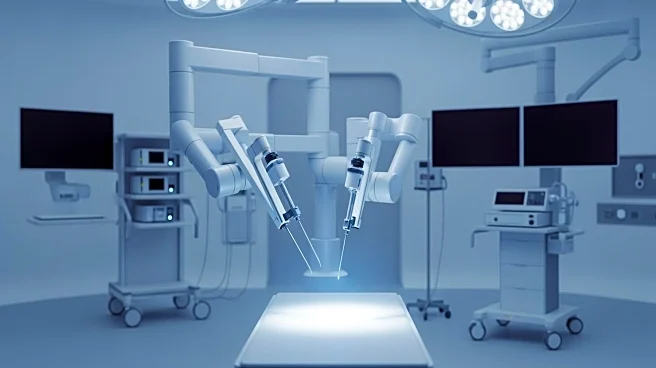What's Happening?
SS Innovations International Inc. has successfully completed its first telesurgery using the SSi Mantra Tele Surgeon Console (TSC). This compact, chair-based system is designed to facilitate telesurgeries
from various settings, including physician offices, by offering portability and requiring less space than traditional surgical command centers. The TSC is equipped with advanced features such as lightweight glasses, a magnified three-dimensional view, and magnetic sensor-based controls. The company aims to make robotic surgery more affordable and accessible globally, having already completed 35 telesurgeries, including 10 cardiac procedures. SS Innovations is also working towards FDA approval for its SSi Mantra system, with a human factors validation study completed last month.
Why It's Important?
The development of the SSi Mantra Tele Surgeon Console represents a significant advancement in the field of telesurgery, potentially transforming how surgical expertise is delivered. By enabling surgeries to be performed remotely, the TSC can increase patient access to specialized surgical care, particularly in regions lacking advanced medical facilities. This innovation could lead to cost reductions in healthcare by minimizing the need for extensive operating room resources. Additionally, the ability to perform surgeries remotely may enhance collaboration among medical professionals globally, fostering a more interconnected healthcare system.
What's Next?
SS Innovations is focused on obtaining FDA approval for its SSi Mantra system, which could pave the way for broader adoption in the U.S. healthcare market. As the company continues to refine its technology, it may explore partnerships with hospital networks to integrate the TSC into their facilities, further expanding access to telesurgery. The successful implementation of this technology could prompt other medical device companies to invest in similar innovations, potentially leading to a competitive market for telesurgery solutions.
Beyond the Headlines
The introduction of telesurgery technology raises important ethical and legal considerations, such as ensuring patient safety and maintaining high standards of care during remote procedures. Additionally, the widespread adoption of such technology could lead to shifts in medical training, with a greater emphasis on digital and remote surgical techniques. As telesurgery becomes more prevalent, healthcare systems may need to adapt their infrastructure to support these advanced technologies, potentially influencing long-term healthcare policy and investment decisions.










